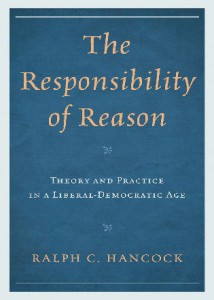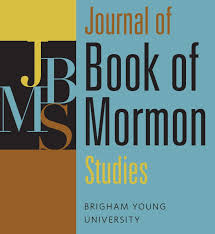 Here is editor John Welch’s able summary of Joe Spencer’s serious and thoughtful review essay on my The Responsibility of Reason (Rowman & Littlefield 2011). Joe’s review just appeared in BYU Studies.
Here is editor John Welch’s able summary of Joe Spencer’s serious and thoughtful review essay on my The Responsibility of Reason (Rowman & Littlefield 2011). Joe’s review just appeared in BYU Studies.Joseph Spencer’s essay about Professor Ralph Hancock’s importantbook, The Responsibility of Reason, also opens up further possibilities.As Spencer summarizes, Hancock argues that it is necessary to recog-nize that the world of concrete practices bears within itself a set of orga-nizing forms that are governed by “the good,” such that the materialworld bears a unified moral topography. While finding Hancock’s argu-ment plausible, Spencer proposes that it may not be the only possibility.He offers instead a revitalization of the idea of a pluralistic and inconsis-tent cosmos, using the modern French philosopher Badiou as a model.Leaving much still to be explored, Spencer concludes: “To understandwhat Mormonism has to say in the history of thought, it will be neces-sary to decide how to conceive of a materialism that nonetheless affirms(whether within consistent or inconsistent realms) the existence of amoral order” (73)
Joseph and I seem to go this far together in our critique of extreme modern rationalism, this idealistic materialism whose effectual truth is Technology — but then one of us somehow loses the thread. Our parting company seems to me to be owing to two main thrusts of my argument that I seem not to have made clear enough, or that somehow got lost in what is a pretty long and complicated text in which I contend with various philosophical adversaries and rivals from various angles. These overlooked main arguments are: (1) my argument is not metaphysical but practical (in a way that is inseparable from critical-reflexive); and (2), I do not appeal to some pre-modern Platonic totalizing cosmology (if indeed the ancients can be accused of such), but rather to a Tocquevillean balancing of ancient and modern responses to the Truth and to the openness of the human spirit.
I am hoping Joseph will be able to reply so that we may continue the dialogue. I thank him for his diligent attention to a pretty difficult book.












